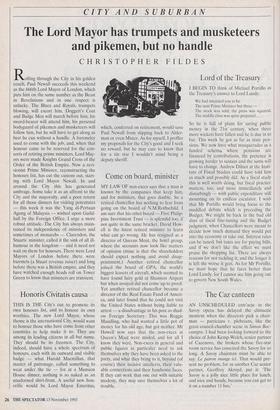Lord of the Treasury
I BEGIN TO think of Michael Portillo as the Treasury's answer to Lord Lundy:
We had intended you to be
The next Prime Minister but three — The stock was sold, the press was squared, The middle class was quite prepared.
So he is full of plans for saving public money in the 21st century, when three more wickets have fallen and he is due in to bat. This week he got as far as state pen- sions. We now have what masquerades as a funded scheme, where pensions are financed by contributions, the pretence is growing harder to sustain and the sums will have to change. Andrew Dilnot at the Insti- tute of Fiscal Studies could have told him as much and possibly did. As a fiscal study this is well worth doing, but fiscal practice matters, too, and more immediately and disturbingly — with public expenditure still mounting on its endless escalator. 1 wish that Mr Portillo would bring focus to the muddled debate which is preceding the Budget. We might be back in the bad old days of fiscal fine-tuning and the Budget judgment, when Chancellors were meant to decide how much demand they would put into the economy or take out. Interest rates can be tuned, but taxes are for paying bills, and if we don't like the effect we must prune the shopping list. There are always reasons for not tackling it, and the longer it is left the worse it gets. As for Mr Portillo, we must hope that he fares better than Lord Lundy, for I cannot see him going out to govern New South Wales.


























































 Previous page
Previous page